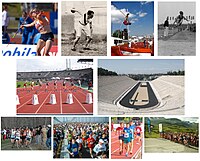
Polyrhythmic foraging and competitive coexistence
Sign Up to like & getrecommendations! Published in 2020 at "Scientific Reports"
DOI: 10.1038/s41598-020-77483-3
Abstract: The current ecological understanding still does not fully explain how biodiversity is maintained. One strategy to address this issue is to contrast theoretical prediction with real competitive communities where diverse species share limited resources. I… read more here.
Keywords: foraging competitive; activity cycles; coexistence; polyrhythmic foraging ... See more keywords

Evidence for photometric activity cycles in 3203 Kepler stars
Sign Up to like & getrecommendations! Published in 2017 at "Astronomy and Astrophysics"
DOI: 10.1051/0004-6361/201730599
Abstract: In recent years it has been claimed that the length of stellar activity cycles is determined by the stellar rotation rate. It is observed that the cycle period increases with rotation period along the so-called… read more here.
Keywords: activity cycles; period; cycle; rotation ... See more keywords

Activity cycles in members of young loose stellar associations
Sign Up to like & getrecommendations! Published in 2017 at "Astronomy and Astrophysics"
DOI: 10.1051/0004-6361/201730967
Abstract: Magnetic cycles have been detected in tens of solar-like stars. The relationship between the cycle properties and global stellar parameters is not fully understood yet. We searched for activity cycles in 90 solar-like stars with… read more here.
Keywords: cyc; magnetic activity; activity cycles; time ... See more keywords

Predictions of Solar Activity Cycles 25 and 26 using Nonlinear Autoregressive Exogenous Neural Networks
Sign Up to like & getrecommendations! Published in 2023 at "Monthly Notices of the Royal Astronomical Society"
DOI: 10.1093/mnras/stad1460
Abstract: This study presents new prediction models of the 11-year solar activity cycles (SC) 25 and 26 based on multiple activity indicator parameters. The developed models are based on the use of Nonlinear Autoregressive Exogenous (NARX)… read more here.
Keywords: autoregressive exogenous; activity cycles; activity; solar activity ... See more keywords

Daytime rest: Association with 24‐h rest–activity cycles, circadian timing and cognition in older adults
Sign Up to like & getrecommendations! Published in 2022 at "Journal of Pineal Research"
DOI: 10.1111/jpi.12820
Abstract: Growing epidemiological evidence points toward an association between fragmented 24‐h rest–activity cycles and cognition in the aged. Alterations in the circadian timing system might at least partially account for these observations. Here, we tested whether… read more here.
Keywords: cognition; rest; activity cycles; rest activity ... See more keywords